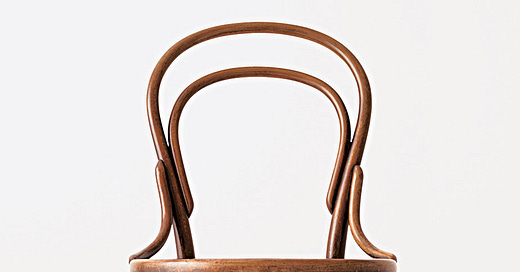Michael Thonet was a woodworking genius, a gifted designer and an astute businessman. He was German, born in 1796, in a town called Boppard, part of the Electorate of Trier, under the Holy Roman Empire. He died in 1871 (aged 74) in Vienna, the capital of the Austro-Hungarian Empire. European history is damned complicated.
He was a pioneer in the industrialization of furniture manufacture. His experiments in the production of bentwood furniture widely influenced both contemporary and modern styles and his functional and exquisitely designed chairs are still being manufactured.
His bentwood chairs are among the most successful examples of early mass-produced furniture. They were exhibited at the Great Exhibition of 1851 in London and were sold in vast quantities throughout Europe and the United States for the rest of the century.
His most well-known design is the No. 14 chair from 1859; also known as the bistro- or Vienna chair. With its affordable price and simple design, it became one of the best-selling chairs ever made. Some 50 million No. 14s were sold between 1859 and 1930, and millions more have been sold since. Its combination of elegant lightness and everyday knockaboutability made it an ubiquitous requisit in cafés all over Europe.
This week’s woodworking video is a German high-quality documentary (with English subtitles) which shows the production process from forest to spray booth. There is some industrial porn; gorgeous vintage machinery from the golden age of analogue, indestructible cast iron — specially developed for the unusual production steps involved in bentwood manufacturing, and some pretty kinky bending and clamping jigs, if you’re so inclined.
***




This is wonderful. The countless times I have sat on a 14 and never, ever for a moment thought about it, let alone the work that went into making it!
It makes one wonder about all of the other things in life that we just take for granted. Perhaps it's time for a little more gratitude.
cylindrical machines - never seen this type of thing before. Nice to see the constant reminder of attention in the work. That'd rule out many a school leaver these days.
My greek father in law actually still does the chair weaving by hand out in Corfu. Normally it's for the wealthy folk that have had the chairs for 100+ years in their family and want to have them repaired by a local craftsmen. Sadly there's less of this work around as everyone opts for "modern" and quite vile stuff produced by low quality mass production.
I also loved the way the assembler used soap in the step called "the final argument" I knew wax would work for screws, but for some reason I'd never considered using soap.
Finally, custom made machines are just as artful as their product.
It is all a beautiful orchestration.
Thanks for the video!
I really shouldn't be watching videos right now, but I am procrastinating!